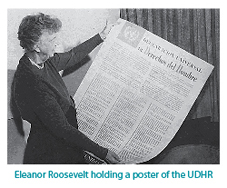The Universal Declaration of Human Rights: Still Ahead of Its Time?
Threescore years ago, on December 10, 1948, fifty-three nations on the earth, scarred by a terrible war, brought forth something new in human history, a Universal Declaration of Human Rights. The echoes of the American and French revolutions and of Lincoln’s universalizing of rights in the Gettysburg Address suggest the context and also the “not-yetness” of this sixty-year-old document. Whereas Thomas Jefferson had used deistic phrasing (“Nature and Nature’s God”) in the Declaration of Independence, Eleanor Roosevelt and the other members of the commission that drafted the UDHR in 1948 were careful to employ a clearly secular language–recognizing that many persons and countries varied enormously in religiosity and secularity, and many assumed that their God intended something different for them than for others.
 The preamble not only describes well the entire document but anticipates continuing broadening of details and meanings:
The preamble not only describes well the entire document but anticipates continuing broadening of details and meanings:
…Whereas the peoples of the United Nations have in the Charter reaffirmed their faith in fundamental human rights, in the dignity and worth of the human person and in the equal rights of men and women and have determined to promote social progress and better standards of life in larger freedom…
The thirty specific articles of the UDHR stress the importance of a rule of law to guarantee people’s rights of conscience, assembly, speech, movement, and religion. They also pioneer in asserting rights to health and family and education. The Declaration was not only ahead of its time but remains ahead of most of the 193 nations now comprising the UN.
The major focus of the Human Rights Commission was on promotion of these rights rather than investigation and enforcement. Enlargements were both charter-based and treaty-based. In 1967, with decolonization and new member nations, interventionism became central. Member nations, many with poor human rights records, were elected by the five regional groups. Human rights concerns were better sustained by a sub-commission and by the office of High Commissioner for Human Rights (created in 1993). Finally, in 2006, the UN General Assembly replaced the commission with the Human Rights Council. At this writing, the council is under sharp criticism from many human rights NGOs for its focus on Israel and for its favoritism of the Organization of the Islamic Conference. For several years that group has argued against provisions for the equal treatment of men and women. It has successfully passed measures against “defamation of religion” and has ruled against criticism of Sharia law and investigation of jihad.
The International Humanist and Ethical Union has taken the position that freedom of religion applies to the right of individuals not to be forced or oppressed, whereas free expression and conscience allow the examination and criticism of all beliefs. From this viewpoint, there is no “defamation,” however the existence of blasphemy laws in many countries often leads to fatal consequences.
Is the glass half-empty or half full? The status of human rights depends on whether one looks at the commission/council or the sub-commission and high cCommissioner. The same holds when one examines the International Court of Justice (created in 1945) and the International Criminal Court created in 2002. Note also that the United States was voted out of the commission and has chosen to stay out of the council–and has refused to join the International Criminal Court. Added to our fears that military personnel might be brought before foreign courts, the fear now looms that U.S. politicians who have condoned torture and the death of innocents (the main definition of terrorism) might also be indicted by foreign or international courts. Such intransigencies surely weaken the voices of U.S. humanists in the world community.
UN bodies have meanwhile been expanding world concerns on the meanings of human rights. Children’s rights have a new visibility. Disabled persons have new recognition of rights. Indigenous people are more visible. Societies can no longer ignore rights of non-citizens and refugees. The disappeared are no longer forgotten.
Our strength as humanists is that a) we focus on values, b) we insist that values have consequences that can be known empirically, and c) we put individual human flourishing in tandem with societal flourishing. We need to underscore the Enlightenment role in recognizing the universality of human rights, and the role of reason in expanding those rights. Sustainable democracy depends upon human rights. In addition, we now know that democratic societies are less likely to use violence against other democracies and even somewhat less likely to use violence against non-democratic societies. We also know that human welfare is more likely to emerge in societies that defend human rights. We know that income disparity destabilizes societies. We know that sexism disadvantages not only girls and women but their entire societies in terms of reduced leadership. We know that new democracies are more stable when they discover the truths about previous authoritarianism than when dictators receive impunity. Nonbelievers and liberal religionists have made enormous progress in recognizing and establishing rights for the range of our sexual orientations, expanding the structures and meanings of family.
We know from research on 117 countries conducted by the Culture Matters Research Project and the Cultural Change Institute that worldviews do make major differences in human progress, and that Protestant societies are more democratic and progressive than Catholic or Orthodox, Muslim, Hindu, or Buddhist societies. We also know that “strong” religions (a more accurate term than fundamentalist) in all traditions reduce human welfare by reducing human rights.
This December 10, let’s celebrate the still-young history of the Universal Declaration of Human Rights. Let’s keep it in the forefront of the world’s attention. And we U.S. humanists need to bring our own country fully back into the UN–its councils and courts and deliberations. Our actions could go a long way toward helping to restore the devastated moral standing of this country.
